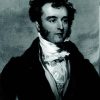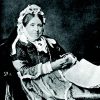Grote and Wakefield streets are paired together in the city of Adelaide and provide the central east/west axis and points of entry to Victoria Square at the heart of the city.
Grote Street was chosen because George Grote was the leader of that first ever minority liberal party in Britain, the Philosophical Radicals. These radicals held the balance of power in the House of Commons after the Reform Bill of 1832 and, in coalition with the Whigs, ensured the passage of the South Australia Act in August 1834. Honouring these men in Adelaide’s streets does justice to the aspirations of some of Britain’s foremost early-nineteenth-century reformers.
George Grote was perhaps the greatest historian of Greece in the nineteenth century. His comprehensive writings on Greek republicanism shaped his worldview and politics. As MP for the City of London, he became a key parliamentary voice during the 1830s for the non-sectarian utilitarian thinkers and rationalists behind the Philosophical Radical party in the House of Commons. The radicals counted among their number Jeremy Bentham, James Mill, John Stuart Mill, David Ricardo, Colonel Robert Torrens, John Arthur Roebuck, Sir William Molesworth and Charles Buller.
Grote’s chief parliamentary legacy was his advocacy for universal suffrage, short parliaments and secret ballots – ideas he first proposed in his 1821 essay Statement of the question of parliamentary reform. It was Grote who invented the ballot box. The essay coincided with the loss of his infant son in the early days of his marriage to Harriet Lewin, a strong-willed and cultured partner who would become central to his career and wellbeing.
Grote was an inaugural member of the Political Economy Club (1821), helped found University College London (1826) and joined the Reform Club’s central committee (1836). He also supported secular education, championing a system of instruction free from religious influence.
After leaving politics in 1849, Grote returned to academia and became Vice Chancellor of University College London in 1862. In 1868 he became President of its Council. He later declined a peerage from Prime Minister Gladstone in 1869, not out of populist sentiment, but particularly due to his writing commitments.
Multilingual and musically gifted, Grote was an accomplished cellist and avid horserider, though a mediocre cricketer. That Grote Street in Adelaide extends westward today to Sir Donald Bradman Drive seems a serendipitous footnote to his legacy.
Born into the prestigious banking dynasty Prescott, Grote, Culverden and Hollingsworth, George Grote was financially secure for life. He was the eldest of eleven children, ten of them boys. Born at Clay Hill, Kent, on 17 November 1794, only his younger brother Francis would ever travel to South Australia.
Though academically gifted, George’s father forced him into the family bank at 16, denying him further formal education. Yet George embraced rigorous self-study, immersing himself in philosophy, economics and history. These habits shaped his intellectual pursuits and later encouraged him to leave political life in favour of scholarship.
Grote met Harriet Lewin near Bexley, and despite interference from a jealous rival and initial opposition from his father, married her in secret in 1820. Their only child died shortly after birth. Harriet remained his emotional anchor and intellectual partner, urging him to engage publicly, write and contribute to reform.
Their early married life was modest. Harriet wrote for the Westminster Review to support them and encouraged George’s professional growth. They regularly rode at a Finsbury riding school. Described as eccentric, politically passionate and influential in elite London circles, Harriet championed the Philosophical Radical cause alongside her husband.
A pivotal moment in Grote’s life was his 1820s association with David Ricardo, James Mill and Jeremy Bentham. Through them, he embraced utilitarianism, adopting their rational, emotionally restrained philosophy. He admired James Mill’s intellectual discipline and saw it replicated in the prodigious young John Stuart Mill. Like John Stuart Mill he was reduced in some way to a disciplined and highly rational thinker and writer who measured every sentence.
In 1821 Bentham was in his 70s, James Mill and Ricardo in their 40s, Grote in his 20s and John Stuart Mill only 14. That same year, Ricardo, Torrens and Mill founded the Political Economy Club. Grote joined shortly thereafter, even collaborating with Bentham on revisions to earlier works.
Utilitarianism peaked in the 1820s. Its followers, particularly James Mill’s disciples, advocated for educational reform. Grote supported institutions like Hazelwood School, founded by Rowland and Matthew Davenport Hill. Hazelwood’s student-led, progressive approach attracted radicals like Grote. Rowland Hill later became Secretary to the South Australian Colonization Commission – a role Grote, as Treasurer of the South Australian Association in 1833, may have influenced.
Freed from his banking obligations by his father’s death in 1830, Grote turned his attention to reform and scholarship. Yet unrest in Britain demanded political action. The push for electoral reform and widespread civil unrest threatened revolution. In this climate, the Philosophical Radicals sought parliamentary leadership—and chose Grote. Young, principled and newly financially independent, he had just published his second reform treatise, Essentials of parliamentary reform (1831).
The Reform Bill finally passed. Grote ran for the City of London and topped the polls with 8,788 votes. At a celebratory dinner hosted by Harriet, the Philosophical Radicals confirmed Grote’s role as their leader in the Commons. He became the parliamentary voice for universal suffrage, annual parliaments and secret voting, raising these issues year after year until his resignation in 1841.
Grote’s political stance included calls for a broad franchise, annual elections, secret ballots, public expenditure reviews, church reform and removal of bishops from the House of Lords. He opposed slavery, championed universal education and fought the Corn Laws and taxes on life’s essentials.
In December1833 Grote joined the South Australian Association as Treasurer and at the promotional meeting at Exeter Hall he proposed William Wolryche Whitmore as its Chair. Though originally proposed as a Colonization Commissioner, Grote withdrew his name when the Whigs fell and Robert Peel’s Tory administration came to power. Despite this, he remained a staunch supporter of the South Australia project.
He served in three parliaments before resigning to focus on History of Greece, which he released in twelve volumes between 1846 and 1856 to critical acclaim. His scholarship earned him a Doctorate of Civil Law from Oxford in 1852, conferred by the 14th Earl of Derby – himself commemorated in Adelaide’s Stanley Street. As Vice Chancellor of the University of London, Grote fought to preserve its secular character and advocated for women’s admission to the medical course.
Even in retirement, Grote remained close to politics, often walking and talking with John Stuart Mill. In 1865 Mill ran for the City of Westminster, with Grote as his returning officer and possibly campaign manager. Grote’s intellectual life persisted. After History of Greece, he wrote extensively on Plato, publishing Plato, and the other companions of Sokrates in 1865. His work on Aristotle remained unfinished.
Accolades flowed in his later years. He was elected to the French L’Académie des Sciences Morales et Politiques, received honorary degrees from Oxford and Cambridge, joined The Royal Society and championed educational reform for women. He remained active at the University of London, upholding its academic standards.
International honours also poured in: he was named Honorary Member of universities in Saint Petersburg, Kharkov, Munich, and Königsberg; of academies in Brussels, Amsterdam, and Turin; and of historical societies across the United States. He was awarded the Professorial Chair of Ancient History at the Royal Academy of Arts.
Alas, it seems George Grote’s fame did not spread to South Australia. He passed away on 18 June 1871.






Comments